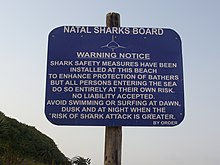
Back هجوم القرش Arabic Útoky žraloků Czech Ataque de tiburón Spanish حمله کوسه Persian Haihyökkäys Finnish Attaque de requin French Ataque de tiburón Galician תקיפות כרישים HE Cápatámadás Hungarian Շնաձկների հարձակումներ Armenian
| Shark attack | |
|---|---|
 | |
| A sign warning about the presence of sharks off Salt Rock, South Africa | |
| Symptoms | Bleeding, Lacerations from the shark’s teeth |
| Complications | Amputation, blood loss, sepsis |
| Causes | Sharks |
| Risk factors | Surfing, storms, being stuck adrift, swimming at night |
| Prevention | Shark barrier, Shark nets, Drum lines, range of other methods |
| Frequency | Rare |
A shark attack is an attack on a human by a shark. Every year, around 80 unprovoked attacks are reported worldwide.[1] Despite their rarity,[2][3][4][5] many people fear shark attacks after occasional serial attacks, such as the Jersey Shore shark attacks of 1916, and horror fiction and films such as the Jaws series. Out of more than 500 shark species, only three are responsible for a double-digit number of fatal, unprovoked attacks on humans: the great white, tiger, and bull.[6] The oceanic whitetip has probably killed many more shipwreck and plane crash survivors, but these are not recorded in the statistics.[7] Humans are not part of a shark's normal diet. Sharks usually feed on small fish and invertebrates, seals, sea lions, and other marine mammals. A shark attack will usually occur if the shark feels curious or confused.[8]
- ^ "Yearly Worldwide Shark Attack Summary". International Shark Attack File. Florida Museum of Natural History, University of Florida. Retrieved 27 November 2017.
The 2016 yearly total of 81 unprovoked attacks was on par with our most recent five-year (2011–2015) average of 82 incidents & 11 deaths annually.
- ^ "ASU shark scientist: Fatal shark attacks 'extremely rare'". ASU News. 6 August 2020.
- ^ "Shark attacks are rare – and related deaths even rarer". The Guardian. 17 August 2011.
- ^ Plumer, Brad (8 July 2014). "How common are shark attacks, really?". Vox.
- ^ "Chart: The animals that are most likely to kill you this summer – The Washington Post". The Washington Post.
- ^ ISAF Statistics on Attacking Species of Shark
- ^ Edmonds, Molly (5 June 2008). "HowStuffWorks "Dangerous Shark 4: Oceanic Whitetip Shark"". Animals.howstuffworks.com. Retrieved 23 September 2010.
- ^ US Department of Commerce, National Oceanic and Atmospheric Administration. "Are sharks dangerous?". oceanservice.noaa.gov. Retrieved 4 January 2024.